Specimen Groups…There, I said it.
What would that conjure up in most angler’s minds? Perhaps a small furtive group of ski-masked, nocturnal poachers communicating in an unfathomable series of coded grunts and whistles who shunned all contact with normal fisher-folk?
Well, before I joined the Osprey Specimen Group in 2004 I’d barely even heard of a specimen group.
I’d set my mind to catching chub. They were a new species for me at the time and as I felt my newly purchased tackle wasn’t up to the demanding rigours of the rivers’ barbel, I figured they’d make a suitable challenge. I wasn’t content to just ‘go fishing’, I needed to really apply myself to the task in hand, set a target and learn along the way. I can’t help it, that’s just the way I approach things.
As it turned out, by starting to put together those first few pieces of the massive jigsaw that is angling, I started catching a few fish to a decent size, meeting a few local anglers and, during the course of winkling out a few tips from the more experienced lads – not an easy task on that venue, I realised some were keeping an ‘eye’ on my doings.
Almost a year later, on Boxing Day evening, I caught my target of a 6lb chub and, suitably elated, texted one of the bailiffs I had got to know. The next thing I knew, after he’d brought me down to earth by telling me “There’s loads of sixes in here, mate….”, he’d put the story of my ‘quest’ up on the website of his specimen group, which had suitably impressed the ‘lads’ and I was invited to join.
To say it opened a few angling doors for me would be an understatement of the highest order.
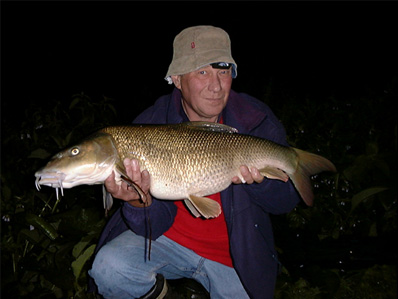 Buoyed by my limited but hard-earned success a few months later, with the additional baggage of several of the local ‘chapter’ of Osprey Specimen Group members, I had my first go for the barbel on the supposedly ‘hard’ River Lea at Fishers Green and this proved to be an example of how a group can work at its best.
Buoyed by my limited but hard-earned success a few months later, with the additional baggage of several of the local ‘chapter’ of Osprey Specimen Group members, I had my first go for the barbel on the supposedly ‘hard’ River Lea at Fishers Green and this proved to be an example of how a group can work at its best.
Firstly, I borrowed a book: “Quest For Barbel” by Tony Miles. This gave me a good grounding in the watercraft involved in finding the fish, then I followed Tony’s suggestion of baiting and waiting ‘til dusk with the result of two sessions, one hard-fighting 9lb fish and one lost.
The next visit I was joined by two other group members, Bob and James. James set up a few yards downstream and, on a whim and not really expecting to catch anything in the middle of the afternoon, I lowered a hookbait and pva bag a couple of feet out in the near margin on a clear patch a few yards downstream in the streamer weed.
I’d been used to attaching a drop-off indicator on a loop of line bobbin-style. Bob saw this and suggested I dispense with the indicator, tighten up to the backlead and set the clutch to give line when the rod went round on a bite. This, he said, would help the bolt-rig to work properly and set the hook on the take.
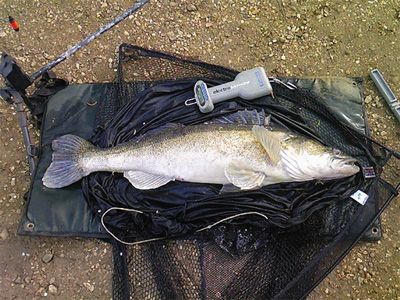 I’d no sooner sat back in my chair with the altered set-up than the rod slammed round and after a spirited fight I had my first double in the net. That worked nicely then!
I’d no sooner sat back in my chair with the altered set-up than the rod slammed round and after a spirited fight I had my first double in the net. That worked nicely then!
Pushing on from that experience James and another member, Clive, went on to catch a lot of barbel over the following weeks (as did I) based on lowering a bait under the rod tip, as they’d seen me do and also by using long ‘swinger’ rigs in heavier flow, as we’d watched Bob put to good use in the capture of his then personal best 13lb 13oz barbel.
So, three of us caught PB’s and all of us had consistent success by taking each others’ ideas on board and then working together. On the back of this Bob and I ended up doing a double-page feature with a certain Mr Bowler for the Angling Times trying to catch his first River Lea double. I must admit I was a bit nervous with the pressure of trying to ‘provide’ Martin with a double first-time out but we did it after Martin put in a huge amount of effort and thought and showed us another approach to catching big fish in adverse conditions. I realised then what being part of a group really meant and the doors it can open for a budding specimen angler.
Over the years we’ve had a number of ‘name’ anglers affiliated with the group. Some have just been on the periphery and graciously offered their presence and contact details for advice and some have become part of the active side of the group and have fished and shared in the fun with us all.
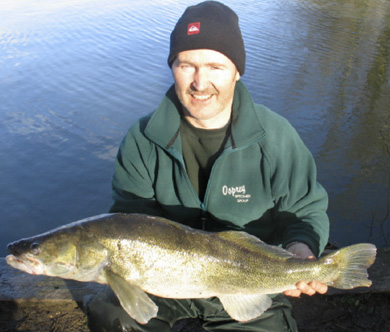 There’s a level of feedback that’s involved that goes beyond what most anglers experience on the bank-side. Inputting information and questions into the Group provides a response that can lead to success, or at least a different set of solutions to a problem. Ploughing the results of that success back in leads to others succeeding with their own tweaks and edges, which they in turn pass back – and everybody wins.
There’s a level of feedback that’s involved that goes beyond what most anglers experience on the bank-side. Inputting information and questions into the Group provides a response that can lead to success, or at least a different set of solutions to a problem. Ploughing the results of that success back in leads to others succeeding with their own tweaks and edges, which they in turn pass back – and everybody wins.
It’s worth mentioning at this point that I’m talking about multi-species specimen groups, not single species ones. Within the broad church of the former there will likely be single species anglers, but not all the same species. Specialists in float fishing, fly fishing and lure fishing nestle alongside the ‘legerers’ for all species and there can be a great deal of cross-over from one discipline to another which can set the old grey matter alight. This is far less prevalent in single-species groups due to the narrowed parameters of targeting one quarry.
The saying “What you get out, depends on what you put in” was never more appropriate. Whereas in the old days of specimen groups, this would be done by social gatherings and newsletters, the current, instant medium of the website makes for a wonderful immediacy and the ‘closed’ site means you can be totally free in giving as much detail as you wish.
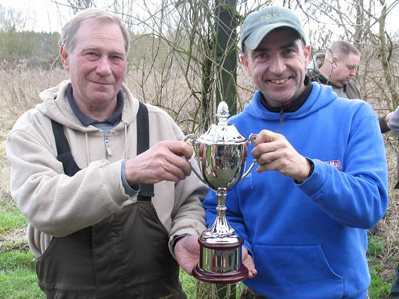 Got a problem? Tell us what it is and we’ll bounce it around.
Got a problem? Tell us what it is and we’ll bounce it around.
The other major advantage is that of the geographical diversity of the members, all points of the compass from Essex to Hampshire to Norfolk to the Midlands and one lucky chap who spends most of his time swanning around the tropics catching fish I’ve never heard of. The website acts as an immediate centre for all and means that you can get real-time, honest river reports on how the water’s looking and fishing, maybe a car-share if another member fancies going, all sorts of useful stuff.
I’ve almost lost count of some of the ‘mini campaigns’ various groups of us have undertaken for various species on a number of venues. I know for myself it’s led to 15lb+ barbel, near 8lb chub, 15lb+ zander and mid-30lb river carp amongst others. Although I rarely travel more than an hour to any venue, having a bunch of like-minded anglers ready to exchange information and catch-reports without the restraint that posting such information in the public domain imposes has been a real godsend.
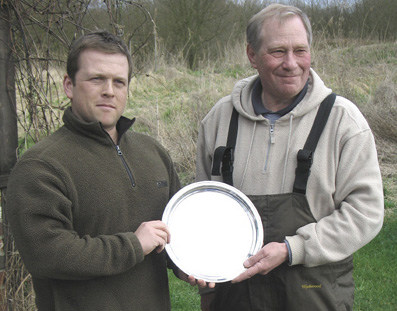 Just as importantly, if any member wants to try a new venue, there’s a good chance of someone having fished there before, knowing the form and ready to give some invaluable tips on where and how to start. When targeting specimen fish, the venues are often hard and every bit of extra knowledge helps you on your way.
Just as importantly, if any member wants to try a new venue, there’s a good chance of someone having fished there before, knowing the form and ready to give some invaluable tips on where and how to start. When targeting specimen fish, the venues are often hard and every bit of extra knowledge helps you on your way.
There’s still a friendly competitive edge involved by the annual award of a group trophy to the best seasons’ catches by any one member. This is driven, of course, by catch returns – a series of pre-determined specimen weights, anything over which is reported to the Records Officer and a list of nominees is voted on by all at the end of the year.
The key to the success of such groups is honesty, integrity and, above all, enthusiasm. Everybody has times when angling has to take a back seat while there are more important priorities to deal with but that needn’t put a stopper on joining in and sharing while others celebrate their success or commiserate with failure.
Angling is, by its nature, a solitary undertaking, but there’s no doubt in my mind that having a solid support group of like-minded people you can call on to help out and encourage, to drive out at short notice for that “personal best trophy shot, to take the Mickey when it’s needed, but also steer your thinking to new areas of endeavour is a boon to anyone prepared to take the plunge.
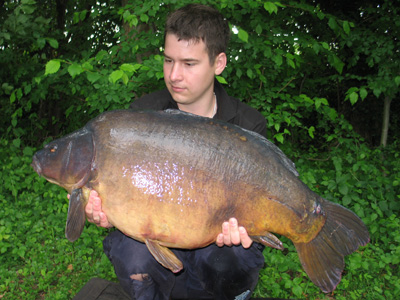 My own angling has come on in undreamt of leaps and bounds over the years as my species and venue horizons have been broadened along with a number of captures that I never would have dreamed of achieving without involvement within a group.
My own angling has come on in undreamt of leaps and bounds over the years as my species and venue horizons have been broadened along with a number of captures that I never would have dreamed of achieving without involvement within a group.
The history of specimen groups is not mine to relate, but I think the future would be rosier for many unsuspecting anglers if they thought about the benefits for themselves.
After all we all strive to catch more and bigger, don’t we?
If anyone is interested in joining the Osprey Specimen Group then take a look HERE and get in touch.










